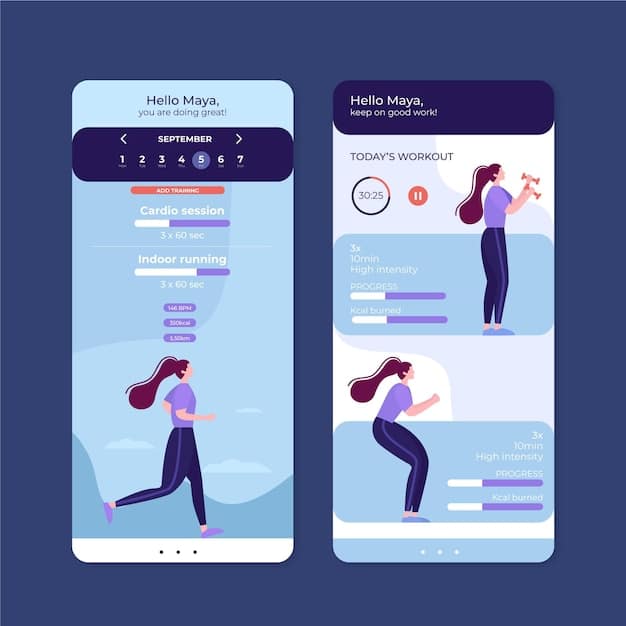Latest Brain Training Apps: Boost Memory & Cognitive Function

Recent updates in brain training apps focus on integrating memory techniques to enhance cognitive function, offering users engaging tools to improve memory, attention, and overall brain health.
Discover the latest brain training apps that harness the power of memory techniques to sharpen your cognitive abilities. These innovative tools offer a fun and effective way to boost your memory, focus, and overall brain health. Stay ahead with the recent updates: the latest brain training apps that use memory techniques to improve cognitive function.
Exploring the Evolution of Brain Training Apps
Brain training apps have become increasingly popular as tools for cognitive enhancement. The evolution of these apps reflects a growing understanding of how memory techniques can be integrated to improve various cognitive functions.
Initially, brain training apps focused on simple memory exercises and games. However, recent updates have incorporated more sophisticated strategies based on proven memory techniques such as mnemonics, spaced repetition, and visualization.
The Integration of Memory Techniques
Modern brain training apps now offer a blend of game-like activities and structured memory exercises. This integration makes the learning process more engaging and effective.
- Mnemonics: Apps use mnemonic devices to help users associate information with memorable cues.
- Spaced Repetition: This technique involves reviewing information at increasing intervals, reinforcing memory over time.
- Visualization: Users are guided to create mental images to enhance recall and retention.
By incorporating these memory techniques, brain training apps provide a comprehensive approach to cognitive improvement.

The latest updates in brain training apps also emphasize personalized training programs that adapt to individual user needs and progress. This ensures that users receive targeted exercises that address their specific cognitive challenges.
In conclusion, the evolution of brain training apps has led to the integration of effective memory techniques, offering users a more engaging and personalized approach to cognitive enhancement.
Top Brain Training Apps with Memory Techniques
Many brain training apps incorporate memory techniques to improve cognitive function. Here are some of the top apps that offer effective and engaging memory training exercises.
These apps often include a variety of games and exercises designed to target different cognitive skills, such as attention, memory, and problem-solving.
Lumosity
Lumosity is a popular brain training app that offers a range of games designed to improve cognitive function. It personalizes training programs based on the user’s performance.
Elevate
Elevate focuses on improving writing, speaking, and reading skills through engaging exercises. Its memory training exercises are designed to enhance recall and retention.
- Daily Exercises: Elevate provides daily exercises that target specific cognitive skills.
- Personalized Training: The app adapts to the user’s skill level, providing a customized learning experience.
- Progress Tracking: Users can track their progress and identify areas for improvement.

Other notable apps include Peak, CogniFit, and NeuroNation, each offering unique features and approaches to memory training.
The integration of memory techniques into these apps helps users improve not only their memory but also their overall cognitive abilities. Regular use of these apps can lead to enhanced focus, better problem-solving skills, and improved overall brain health.
In conclusion, these top brain training apps utilize memory techniques to provide users with effective tools for cognitive enhancement, offering personalized training programs and engaging exercises that promote memory improvement.
How Memory Techniques Enhance Cognitive Function
Memory techniques are strategies that enhance the ability to remember information. These techniques improve cognitive function by making learning more efficient and effective.
By using memory techniques, individuals can organize and encode information in ways that make it easier to recall later. This not only improves memory but also enhances other cognitive skills.
Types of Memory Techniques
There are various memory techniques, each designed to improve different aspects of memory and cognitive function.
- Chunking: Breaking down large amounts of information into smaller, manageable chunks.
- Association: Linking new information to existing knowledge to create meaningful connections.
- Storytelling: Creating a narrative to help remember a sequence of information.
These techniques leverage the brain’s natural ability to process and retain information, leading to improved cognitive performance.
Memory techniques also promote active learning, encouraging individuals to engage with the material and create personalized strategies for memorization. This active engagement strengthens neural connections and enhances cognitive function.
In conclusion, memory techniques enhance cognitive function by improving information encoding, promoting active learning, and strengthening neural connections, resulting in better memory and overall cognitive performance.
Personalized Brain Training: Tailoring Apps to Your Needs
Personalized brain training involves tailoring the exercises and activities in brain training apps to meet individual user needs and preferences. This approach enhances the effectiveness of brain training by addressing specific cognitive weaknesses and goals.
Personalization can be achieved through various methods, including adaptive algorithms, user feedback, and customized training programs.
Adaptive Algorithms
Adaptive algorithms adjust the difficulty and content of exercises based on the user’s performance. This ensures that users are consistently challenged without being overwhelmed.
Benefits of Personalized Training
Personalized brain training offers several benefits over generic brain training programs.
- Targeted Improvement: Customized exercises focus on specific cognitive areas that need improvement.
- Increased Engagement: Personalized programs are more engaging as they align with individual interests and goals.
- Faster Progress: Tailored training leads to quicker and more noticeable cognitive improvements.
By leveraging these strategies, brain training apps can provide a more effective and enjoyable learning experience.
The latest updates in brain training apps often include advanced personalization features that utilize machine learning and artificial intelligence to create highly customized training programs.
In conclusion, personalized brain training tailors exercises to individual needs, increasing engagement and leading to faster and more targeted cognitive improvements, ultimately enhancing the overall effectiveness of brain training programs.
The Science Behind Brain Training and Memory
The effectiveness of brain training apps and memory techniques is supported by scientific research in cognitive neuroscience. Studies have shown that targeted brain training exercises can lead to measurable improvements in cognitive function.
These improvements are often associated with changes in brain structure and function, including increased neural connections and improved efficiency of cognitive processes.
Neuroplasticity and Brain Training
Neuroplasticity refers to the brain’s ability to reorganize itself by forming new neural connections throughout life. Brain training exercises stimulate neuroplasticity, leading to cognitive enhancements.
- Enhanced Memory: Brain training can improve working memory, long-term memory, and recall abilities.
- Improved Attention: Targeted exercises can enhance focus and concentration.
- Increased Processing Speed: Training can lead to faster cognitive processing and reaction times.
Research also suggests that the benefits of brain training can transfer to real-world tasks, such as problem-solving, decision-making, and learning new skills.
However, it is important to note that the effectiveness of brain training can vary depending on the individual, the type of exercises used, and the consistency of training.
In conclusion, the science behind brain training and memory supports the use of targeted exercises to improve cognitive function through neuroplasticity, leading to enhanced memory, attention, and processing speed.
Future Trends in Brain Training Apps
The field of brain training apps is constantly evolving, with new technologies and techniques being developed to enhance cognitive function. Future trends in this area are expected to focus on increased personalization, gamification, and integration with other technologies.
These trends aim to make brain training more engaging, effective, and accessible to a wider range of users.
Integration with Virtual Reality (VR)
VR technology offers immersive and interactive environments that can be used to create more engaging and effective brain training exercises.
Potential Future Developments
Other potential future developments in brain training apps include:
- AI-Powered Personalization: Advanced AI algorithms will provide even more personalized training programs based on real-time data and user feedback.
- Biometric Integration: Apps will integrate with wearable devices to monitor physiological data and adjust training accordingly.
- Cognitive Rehabilitation: Brain training apps will be used more extensively in cognitive rehabilitation programs for individuals with neurological conditions.
These advancements promise to transform the way we approach cognitive enhancement and rehabilitation.
The ongoing research and development in brain training apps are expected to lead to even more innovative and effective tools for improving cognitive function in the future.
In conclusion, future trends in brain training apps include increased personalization through AI, integration with VR and biometrics, and expanded use in cognitive rehabilitation, promising more engaging and effective tools for cognitive enhancement.
| Key Point | Brief Description |
|---|---|
| 🧠 Memory Techniques | Strategies to enhance information recall. |
| 📱 Brain Training Apps | Applications designed to improve cognitive functions. |
| 📈 Cognitive Enhancement | Improving mental abilities such as memory and focus. |
| 💡 Personalization | Tailoring exercises to individual needs. |
Frequently Asked Questions
▼
Brain training apps are software applications designed to improve cognitive functions like memory, attention, and problem-solving through various exercises and games.
▼
Memory techniques enhance cognitive function by improving information encoding, promoting active learning, and strengthening neural connections, resulting in better memory and overall cognitive performance.
▼
Popular memory techniques include mnemonics, spaced repetition, chunking, association, and visualization. These techniques help users encode and recall information more effectively.
▼
Personalization can be achieved by utilizing adaptive algorithms, providing user feedback, and choosing customized training programs that align with your specific cognitive goals and interests.
▼
Future trends include increased personalization through AI, integration with virtual reality (VR) and biometrics, and expanded use in cognitive rehabilitation programs, promising more effective tools for cognitive enhancement.
Conclusion
In conclusion, the latest brain training apps offer innovative ways to improve cognitive function by integrating proven memory techniques. These apps provide personalized, engaging tools that can help users enhance their memory, focus, and overall brain health. By staying informed about these recent updates, individuals can effectively leverage these resources to boost their cognitive abilities.





